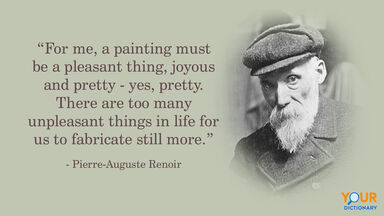Impressionism Definition
ĭm-prĕshə-nĭzəm
noun
A theory and school of painting exemplified chiefly by Monet, Pissarro, and Sisley, but also by Manet, Renoir, etc., whose chief aim is to capture a momentary glimpse of a subject, esp. to reproduce the changing effects of light by applying paint to canvas in short strokes of pure color.
Webster's New World
A literary style characterized by the use of details and mental associations to evoke subjective and sensory impressions rather than the re-creation of objective reality.
American Heritage
A style of art music of the late 1800s and early 1900s, often evoking a dreamy mood and characterized by modal or whole-tone scales, rich and often dissonant harmonies in unconventional progressions, and the avoidance of traditional forms.
American Heritage
(music) A style that avoided traditional harmony, and sought to invoke the impressions of the composer.
Wiktionary
Other Word Forms of Impressionism
Noun
Singular:
impressionismPlural:
impressionismsOrigin of Impressionism
-
From French impressionnisme
From Wiktionary
Find Similar Words
Find similar words to impressionism using the buttons below.


